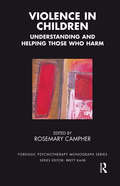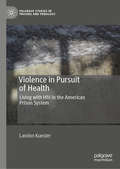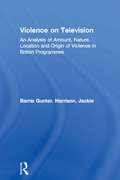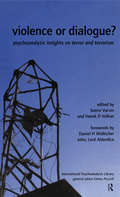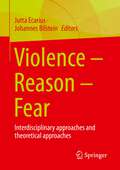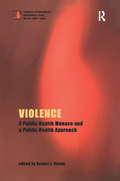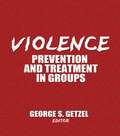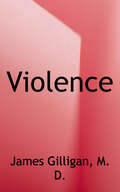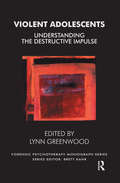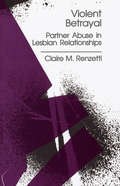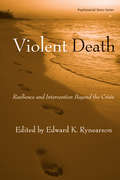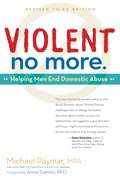- Table View
- List View
Violence in America: Group therapists reflect on causes and solutions
by Robert H. Klein and Victor L. SchermerViolence is a growing problem in American society, and hardly a day goes by that we don’t hear about yet another heart-wrenching episode of mass violence. Such events, unfortunately, are only the most public manifestation of violence in America. The full nature and extent of daily violence, the various and pervasive forms it takes, and the enormous social, emotional, moral, and economic consequences that result, remain largely outside of our awareness. More importantly, our ability to identify the root causes and know how best to effectively intervene remains limited. Most investigations in this field have focused on the individual psychodynamic characteristics of the perpetrators. The underlying group dynamic factors that include consideration of broader social, cultural, socioeconomic, and historical variables have received less attention. This volume brings together for the first time a collection of distinguished group psychotherapists, all of whom have been trained to recognize both individual psychodynamic characteristics and group dynamic factors, to apply the lessons learned through years of clinical practice to arrive at a deeper understanding of the etiology, treatment, and prevention of violence. This book was originally published as a special issue of the International Journal of Group Psychotherapy.
Violence in Animal Cruelty Offenders (SpringerBriefs in Psychology)
by Tia Hoffer Holly Hargreaves-Cormany Yvonne Muirhead J Reid MeloyThis book presents results from a BAU study including 259 active, animal cruelty cases. In addition, there were a total of 495 animal victims including numerous species, but dogs (64%) were the predominant animal victim. The offenders were all male, ranging in age from 17-years old to 82 years old (mean age of 34 years) and 73.44% had arrests for various other crimes prior to and/or following the instant animal cruelty arrest. Sixty percent of the offenders had been arrested for interpersonal violence prior, concurrent and/or post the instant active animal cruelty incident.
Violence in Children: Understanding and Helping Those Who Harm (The Forensic Psychotherapy Monograph Series)
by Rosemary CampherThis book increases the reader's understanding of violent children and the value and vicissitudes of their psychoanalysis and psychoanalytic psychotherapy. It explores various aspects of violence and the attendant emotional, psychological, biological, and social features in children.
Violence in Extreme Conditions: Ethical Challenges in Military Practice
by Eric-Hans Kramer Tine MolendijkAs an organization operating under extreme conditions, the military is often confronted with destructive behavior from individuals, organizations, and societies. Written by experts from a variety of disciplines, this open access book reflects on confrontations with violence under extreme conditions and the various challenges that arise.By examining real first-hand accounts of soldiers’ deployments, the contributions shed new light on the multifaceted and sometimes hidden dynamics of destructive violent behavior and offer an ethical reflection on military practices. In addition, they address topics such as moral decision-making in violent contexts, military trauma, organizational change, and military ethics education.The interdisciplinary exploration of these topics has been the primary focus of Désirée Verweij, who was the Chair of Military Ethics at the Netherlands Defence Academy from 2008 to 2021. The contributions in this book are written in honor of her scholarly achievements and help to ensure that these important issues continue to receive attention. The book will appeal to scholars of military studies, organizational studies and military ethics, and to professionals and decisionmakers in military organizations.
Violence in Families: Integrating Research into Practice (Advances in Preventing and Treating Violence and Aggression)
by Peter SturmeyThis book examines the nature, prevention, and treatment of violence within families. It reviews the definition of contemporary families, emphasizing various structures, including nuclear families, reconstituted families, gay and lesbian families, and recent immigrant families. In addition, the volume describes the nature of and risk factors for family violence from the perspectives of both victims (e.g., infants, children, seniors) and perpetrators (e.g., adolescent family members, women). It identifies the implications and explores strategies for prevention, treatment, and services. In addition, the volume directly addresses practice and evidence-based interventions for individual perpetrators, family interventions, interventions for victims and systemwide interventions (e.g., those involving the courts, police, and national policy). Chapters review the best available quality evidence from randomized controlled trials, systematic reviews, meta-analyses, research syntheses, and evidence-based recommendations from expert panels and government agencies. Case studies illustrate the application of evidence-based practice to violence within the family to demonstrate the effectiveness of the intervention. Topics featured in this book include:Definition and conceptualization of family.Definition and measurement of as well as risk factors for family violence.Family violence in various traditional and nontraditional families.Prevention strategies as well as Individual and family treatments for perpetrators and victims of family violence.Social policy and legal interventions for family violence. Violence in Families is a must-have resource for researchers, professors, and graduate students as well as clinicians, therapists, and other professionals in developmental psychology, family studies, forensic psychology, criminology/criminal justice, public health, psychotherapy/counseling, psychiatry, social work, educational policy and politics, health psychology, nursing, and behavioral therapy/rehabilitation.
Violence in Intimate Spaces: Law and Beyond (Sustainable Development Goals Series)
by Pinki Mathur Anurag Santwana DwivedyThis book provides a textured understanding of intimate violence across the unlimited stretch of human relationships, institutions, and social structures. The volume has been conceptualized with the overarching objective to provide the reader with a collection of thoughtfully selected chapters that critically examine existing literature for an in-depth analysis of institutions through the lens of violence, beyond disciplinary and topical boundaries, from a range of methodologies. The book encourages reflections on the complexities of society, its institutions and gendered norms that enmesh violence and intimate relationships. It further examines the socio-normative contexts within which violence operates as a tool for maintaining inequalities in society. The chapters in this volume attempt to address questions such as: What are the complexities in the relationship between the perpetrator and the victim which sustain and legitimize violence? What are the diverse dimensions of violence in intimate relationships? What role does violence in intimate spaces play in preserving status quo and the pervasive gendered hierarchies within society and its institutions? Who is vulnerable to violence and why? The book covers conversations on intimate space violence and relationships that have not been explored hitherto in mainstream academic debates. The volume pivots violence fundamentally as a product of ‘entitlements’ based on gendered social hierarchies and critical intersectionalities to examine its manifestations in a variety of intimate situations and relationships beyond socio-cultural, religious and geographical boundaries. The book provides invaluable learnings for academics, researchers, students, lawyers, sociologists, social workers, health professionals and policymakers.
Violence in Psychiatry
by Stephen M. Stahl Warburton, Katherine D. and Stahl, Stephen M. Katherine D. WarburtonThe association between violence and mental illness is well studied, yet remains highly controversial. Currently, there does appear to be a trend of increasing violence in hospital settings, including both civilly and forensically committed populations. In fact, physical aggression is the primary reason for admission to many hospitals. Given that violence is now often both a reason for admission and a barrier to discharge, there is a pressing need for violence to be re-conceptualized as a primary medical condition, not as the by-product of one. Furthermore, treatment settings need to be enhanced to address the new types of violence exhibited in inpatient environments and this modification needs to be geared toward balancing safety with treatment. This book focuses on violence from assessment, through underlying neurobiology, to treatment and other recommendations for practice. This will be of interest to forensic psychiatrists, general adult psychiatrists, psychiatric residents, psychologists, psychiatric social workers and rehabilitation therapists.
Violence in Pursuit of Health: Living with HIV in the American Prison System (Palgrave Studies in Prisons and Penology)
by Landon KuesterThis book offers a unique examination of how violence is situationally induced and reproduced for those inmates living with HIV in a US State prison system. Imprisonment is the only space where Americans have a constitutional right to healthcare but findings from this research suggest that accessing this care and associated welfare benefits requires some degree of violence. This book documents how HIV-positive inmates went about achieving agency through harm to their bodies and social standing to improve their health and wellbeing, in prison and upon re-entry to the community. It focusses on ethnographic research which was carried out in seven penal facilities in New England and comprises of accounts from inmates, prison staff, healthcare providers, ex-offenders, and community social workers. This book speaks to academics interested in prisons, violence, health, and ethnographic research, and to policy makers.
Violence in the Military (SpringerBriefs in Psychology)
by Vincent B. Van Hasselt Monty T. Baker Alyssa R. Ojeda Hannah Pressley Jessica Blalock Riki Ann Martinez Brian A. MooreThis brief highlights issues relating to military service members’ expression of violence outside of the military due to the constant readiness for or the exposure to organized violence. It investigates how service members are affected by these experiences, considering both the exacerbation of aggressive traits and the impact it has on mental health. The chapters address the following types of non-combat related violence:Suicide and Self-Harm in the MilitaryMilitary Sexual Violence: Sexual Assault, Sexual Harassment, and Sexual HazingIntimate Partner and Domestic Violence Among Military PopulationsViolent Criminal Behavior in the Military The volume also reviews the contributing factors to the perpetration of violence, including personality traits (i.e., aggression), the military life cycle, interpersonal dynamics, and mental health. It ultimately poses future directions to mitigate risk factors for non-combat related violence. This brief is ideal for military leaders, military psychologists, and mental health providers of service members and veterans.
Violence on Television: An Analysis of Amount, Nature, Location and Origin of Violence in British Programmes (Routledge Communication Ser.)
by Barrie Gunter Jackie HarrisonTelevision is often accused of showing too much violence. However, it is rare that anyone stops to ask what this statement means. Violence on Television provides an objective analysis of the violence on television, how much there is and what form it takes.It presents findings from the largest ever sudy of the depiction of violence on television carried out in Britain, funded by the British Broadcasting Corporation and the Independent Television Commission. As well as presenting a quantitative analysis of the amount of violence on television, this research places great emphasis on investigating the character of violent portrayals and the contexts in which they occur.Barrie Gunter and Jackie Harrison present a detailed literature review, which examines previous research from around the world. They then explain the methodology and look at the problems of measuring and quantifying violence on television. They examine the specific attributes of violence, including the form it takes, its physical setting, its motives and consequences, and the nature of the characters involved as either aggressors or victims. They also examine the amount and nature of violent portrayals in different programme genres, such as films and drama, entertainment programming, news and factual programmes, and children's programmes.The book will be of interest to students and researchers in psychology, communication studies and media studies.
Violence or Dialogue?: Psychoanalytic Insights on Terror and Terrorism (Ipa: The International Psychoanalysis Library)
by Sverre VarvinOur understanding of terrorism since the events of September 11th 2001 has usually been channelled through the two dimensional lens of religion and politics. This important new work contributes a richer understanding of terrorism by examining a third dimension of individual and group psychology and demonstrates how insights garnered from the human psyche may be translated into more effective public policy.
Violence – Reason – Fear: Interdisciplinary approaches and theoretical approaches
by Jutta Ecarius Johannes BilsteinThe book explores the question of the significance of fear and reason in the context of cultural violence and subjective different experiences of violence. Perspectives from the social sciences, educational philosophy and cultural studies open up an interdisciplinary approach to violence of culture and media, the experience of fear and vulnerability as well as strangeness and rage.
Violence, Gender and Affect: Interpersonal, Institutional and Ideological Practices (Palgrave Studies in Victims and Victimology)
by Marita Husso Jari Eilola Sanna Karkulehto Tuija Saresma Aarno Laitila Heli SiltalaThis book presents new conceptual and theoretical approaches to violence studies. As the first research anthology to examine violating interpersonal, institutional and ideological practices as both gendered and affective processes, it raises novel questions and offers insights for understanding and resolving social and cultural problems related to violence and its prevention. The book offers multidisciplinary perspectives on various forms and intersections of different types of violence. The research ranges from the early modern era to the present day in Europe, US, Africa and Australia, representing disciplines such as gender studies, history, literature, linguistics, media and cultural studies, psychology, social psychology, social work, social policy, sociology and environmental humanities. With its integrative approach, the book proposes new ideas and tools for academics and practitioners to improve their theoretical and practical understandings of these phenomena as a source of multidimensional inequality in a globalized world.
Violence, Victimisation and Young People: Education and Safe Learning Environments (Young People and Learning Processes in School and Everyday Life #4)
by Thomas Johansson Ylva OdenbringThis edited collection focuses on different aspects of everyday violence, harassment and threats in schools. It presents a number of in-depth studies of everyday life in schools and uses examples and case studies from different countries to fuel a discussion on national differences and similarities. The book discusses a broad range of concepts, findings and issues, under the umbrella of three main themes: 1) Power relations, homosociality and violence; 2) Sexualized violence and schooling; and 3) Everyday racism, segregation and schooling. Specific topics include sexuality policing, bullying, sexting, homophobia, and online rape culture. The school is young people’s central workplace, and therefore of great importance to students’ general feeling of wellbeing, safety and security. However, there is no place where youth are at greater risk of being exposed to harassment and violations than at school and on their way to and from school. Threats are a relatively common experience among school students, but some aspects of these mundane and frequent harassments and violations are not taken seriously and are, therefore, not reported. Harassment and violations often have negative effects on youth and children, and increase their risks of such adverse outcomes as school dropout, drug use, and criminal behaviour. Contemporary research has shown that gender is of great importance to how students handle and report, or do not report, various violent situations. Studies have also revealed how the notions of masculinity and of being a victim can be conflicting identities and affect how students handle situations of threat, violence and harassment. The importance of gender is also particularly evident with regard to sexual harassment. Female students generally report greater exposure to sexual harassment than male students do.
Violence: A Public Health Menace and a Public Health Approach (The Forensic Psychotherapy Monograph Series)
by Sandra L. BloomThis book provides practical information to design specific intervention strategies aimed at preventing the escalation of violence in any community. It provides both practical advice and theoretical stimulation for introductory students and for senior practitioners of forensic psychotherapy.
Violence: Prevention and Treatment in Groups
by George GetzelThis informative and thoughtful book demonstrates the value of social group work concepts applied to domestic and other forms of violence. Written by social work practitioners, each chapter focuses on a different form of violence and the appropriate models of social work with groups. Using detailed accounts of their own practice and research, professionals explain behavioral, interactional, and humanistic approaches toward varying service service populations--including perpetrators, as well as victims or “survivors.” The samples of creative interventions with victims of childhood sexual abuse, rape, and domestic battering will inspire sympathy and reflection among all professionals who too often see the consequences of victimization in their own practices.
Violence: Reflections on a National Epidemic
by James GilliganDrawing on firsthand experience as a prison psychiatrist, his own family history, and literature, the author unveils the motives of men who commit horrifying crimes, men who will not only kill others but destroy themselves rather than suffer a loss of self-respect. <p><p>With devastating clarity, Gilligan traces the role that shame plays in the etiology of murder and explains why our present penal system only exacerbates it. Brilliantly argued, harrowing in its portraits of the walking dead, Violence should be read by anyone concerned with this national epidemic and its widespread consequences.
Violent Accounts: Understanding the Psychology of Perpetrators through South Africa’s Truth and Reconciliation Commission (Qualitative Studies in Psychology #9)
by Robert N. KraftViolent Accounts presents a compelling study of how ordinary people commit extraordinary acts of violence and how perpetrators and victims manage in the aftermath. Grounded in extensive, qualitative analysis of perpetrator testimony, the volume reveals the individual experiences of perpetrators as well as general patterns of influence that lead to collective violence. Drawing on public testimony from the amnesty hearings of the South African Truth and Reconciliation Commission, the book interweaves hundreds of hours of testimony from seventy-four violent perpetrators in apartheid South Africa, including twelve major cases that involved direct interactions between victims and perpetrators. The analysis of perpetrator testimony covers all tiers on the hierarchy of organized violence, from executives who translated political doctrine into general strategies, to managers who translated these general strategies into specific plans, to the staff—the foot soldiers—who carried out the destructive plans of these managers. Vivid and accessible, Violent Accounts is a work of innovative scholarship that transcends the particulars of the Truth and Reconciliation Commission to reveal broader themes and unexpected insights about perpetrators of collective violence, the confrontations between victims and perpetrators in the aftermath of this violence, the reality of multiple truths, the complexities of reconciliation, and lessons of restorative justice.
Violent Adolescents: Understanding the Destructive Impulse (The Forensic Psychotherapy Monograph Series)
by Lynn GreenwoodThis volume looks at the reasons behind adolescent violence, and illuminates the earlier disturbances in the life history of the adolescent, which contribute to violent behaviour. The contributors look beyond the "why" of the behaviour and offer solutions on how to handle the situation. The contributors are all experienced practitioners and draw from their extensive experience in the consulting room. The concise and thought-provoking chapters discuss such problems as suicidal and self-destructive behaviours, school-bullying, violence towards the parents and violence while in care. This book is full of insights into the common problem of adolescent violence, and it should be required reading for all concerned with the young adults of today. Part of the Forensic Psychotherapy Monograph Series.
Violent Betrayal: Partner Abuse in Lesbian Relationships
by Claire M. RenzettiBased on a nationwide study of violence in lesbian relationships, this comprehensive, accessible volume derives from a common theme expressed by the subjects: the sense of having been betrayed, first by their lovers, and subsequently by a lesbian community which tends to deny the problem when victims seek help. Claire M. Renzetti skillfully addresses several central issues: consequences for victims, batterers and the community as a whole, and what we can learn about domestic violence in general by studying violence in lesbian relationships. The research offers a fresh look at domestic violence by examining the phenomenon of women as perpetrators of intimate violence against women, at the same time making a clear distinction between battering and self-defense. Students and professionals in victimology, gender studies, sociology, psychology, criminology, social work, clinical psychology, counseling, and family studies will not want to miss this brilliant work. "Violent Betrayal is an important contribution to domestic violence research and to the study of lesbian relationships. The study′s findings are immediately helpful to clinicians working with those battered in lesbian relationships and provides a deeper understanding of lesbian relationship dynamics. . . . Violent Betrayal dispels common myths about lesbian relationships that, sadly, both laypersons and those in the helping professions, possess." --Family Violence & Sexual Assault Bulletin "Claire Renzetti′s study represents a substantial contribution to understanding this underresearched population. Her recommendations for how services can be improved are essential reading for all service providers." --Readings: A Journal of Reviews and Commentary in Mental Health "A compendium of research on lesbian battering, [Violent Betrayal] contains significant and surprising information about this ignored problem." --Coalition Commentary "One of the first--if not the first--to provide empirical data about a neglected subsample of the battering population, namely battered lesbians. . . . Both qualitative and quantitative analyses of the data are used and are successfully integrated with the literature reviews and other information provided. This constitutes a unique contribution to the field of domestic violence research. It is well-written, and provides readable tables based on the data and illustrative quotes from interviews." --Susan L. Miller, Northern Illinois University "This is an important resource book for women who work with abused women and with lesbians. . . . This is a strong study--one of the first ′pure′ sociological studies on lesbian battering. It begins to open the door on this painful issue that many in our community would like to avoid." --Lambda Book Report "A valuable tool for those in the field of family violence. . . . Claire Renzetti outlines the responses that would help victims of lesbian partner abuse, including specific outreach by family violence programs and ongoing education for their staff and education for medical, police, and other emergency workers. . . . Violent Betrayal is long-awaited and necessary information for those confronting this violence, containing both useful profiles of battering situations and pointers toward responses and further study." --Gay People′s Chronicle "This book will be useful for those doing research on battering and other forms of violence against women, for therapists, and for use in courses on gender, on violence, and on links among theory, research, and practice. It provides rich reviews of relevant research, carefully reveals unexpected assumptions about battering, and provides directories of organizations that provide help. Moreover, Renzetti adds immensely to our knowledge by doing research in a neglected are. She contends that we must ′end the silence′; the book is a valuable sociological contribution to that goal." --Symposium "Renzetti′s analysis is in the best traditions of both feminist research and mainstream social science. Thus, this research is inspired , and informed throughout,
Violent Death: Resilience and Intervention Beyond the Crisis (Psychosocial Stress Series)
by Edward K. RynearsonThis book pulls together a definitive collection of work on the theory and practice of clinical, spiritual, and emotional support after the experience of violent death - counseling beyond the crisis. Over the past decade, there have been countless publications devoted to crisis response, crisis intervention and counseling, disaster mental health services, and support for victims of traumatic events, but almost none devoted to the response planning and community care for those individuals who continue to struggle with trauma and grief issues for more than a few months after a violent death. The chapters in this volume, written by national and international experts in the field, provide the reader with the theoretical and clinical bases necessary for planning and implementing clinical and spiritual services to meet the needs of survivors, witnesses, family and community members of violent death.
Violent No More: Helping Men End Domestic Abuse
by Michael Paymar Anne Ganley<p>Violent No More is for men who have struggled with or are currently being violent in an intimate relationship. Filled with real stories of men who have harmed the ones they love and found the courage to change, this highly acclaimed book has helped thousands acknowledge and reform their abusive behavior. Author Michael Paymar doesn't sidestep the unpleasant reality of domestic violence—included here are the sometimes shocking first-person accounts of violent men, along with those of battered women. More importantly, many of these stories illustrate the ways in which men were able to stop their use of violence and control. <p>This edition contains four new chapters which address the challenges faced by practitioners who work with domestic violence offenders or victims, and the particular struggles faced by combat veterans returning from war, many of whom come home with PTSD and other mental health issues. With group exercises and individual goal-setting plans to help men find healthy ways of responding to conflict, change the cultural conditioning that condones violence, and avoid reverting to old patterns, Violent No More is an essential guide for men dealing with violence issues, as well as for the professionals who assist in their efforts to improve.</p>
Violent Partners: A Breakthrough Plan for Ending the Cycle of Abuse
by Linda G. MillsIn this groundbreaking book, Linda Mills-feminist, scholar, activist, and survivor-challenges the prevailing orthodoxies and maps out a plan to change domestic abuse treatment programs. Drawing on case studies and research from her abuse prevention programs, Mills reveals that intimate abuse is far more complex than we realize, and develops a program for healing that engages everyone caught up in a violent dynamic. Essential reading for therapists, couples, public health experts, and members of the criminal justice system, Violent Partners outlines a breakthrough approach to a major social problem.
Violent States and Creative States (2 Volume Set): From the Global to the Individual
by James Gilligan Gwen Adshead Kate Rothwell Grace Lee Estela Welldon Christopher Scanlon John Adlam Anna Motz Alex Maguire Julian Manley Simon Hackett David W. Jones Matt Killingsworth Thilo Kroll Lucy Neal Tilman Kluttig Bandy Lee John L Young Annie Stopford Gardnel Carter Gina Donoso Gloria Uwizeye Efrat Even-Tzur Ismail Karolia Klaus Hoffmann Barry Richards Aileen Schloerb Hayley Berman Reinmar Du Bois Maggie McAlister Clinton Van der Walt Zoe Berko Sarita Bose Martha Ferrito Martina Mindang Robyn Timoclea Deborah J. Cohan Claude Barbre Jill Barbre Tamsin Cottis Andrew Ware Gerrard Drennan James S. VrettosThis is a provocative collection exploring the different types of violence and how they relate to one another, examined through the integration of several disciplines, including forensic psychotherapy, psychiatry, sociology, psychosocial studies and political science. By examining the 'violent states' of mind behind specific forms of violence and the social and societal contexts in which an individual act of human violence takes place, the contributors reveal the dynamic forces and reasoning behind specific forms of violence including structural violence, and conceptualise the societal structures themselves as 'violent states'. Other research often stops short at examining the causes and risk factors for violence, without considering the opposite states that may not only mitigate, but allow for a different unfolding of individual and societal evolution. As a potential antidote to violence, the authors prescribe an understanding of these 'creative states' with their psychological origins, and their importance in human behaviour and meaning-seeking. Making a call to move beyond merely mitigating violence to the opposite direction of fostering creative potential, this book is foundational in its capacity to cultivate social consciousness and effect positive change in areas of governance, policy-making, and collective responsibility. This two-volume set includes: Volume 1: Structural Violence and Creative Structures ISBN 9781785925641 Volume 2: Human Violence and Creative Humanity ISBN 9781785925658
Violent States and Creative States: Human Violence and Creative Humanity (Volume #2)
by John Adlam Tilman Kluttig Bandy LeeThis is a provocative collection exploring the different types of violence and how they relate to one another, examined through the integration of several disciplines, including forensic psychotherapy, psychiatry, sociology, psychosocial studies and political science. By examining the 'violent states' of mind behind specific forms of violence and the social and societal contexts in which an individual act of human violence takes place, the contributors reveal the dynamic forces and reasoning behind specific forms of violence including structural violence, and conceptualise the societal structures themselves as 'violent states'. Other research often stops short at examining the causes and risk factors for violence, without considering the opposite states that may not only mitigate, but allow for a different unfolding of individual and societal evolution. As a potential antidote to violence, the authors prescribe an understanding of these 'creative states' with their psychological origins, and their importance in human behaviour and meaning-seeking. Making a call to move beyond merely mitigating violence to the opposite direction of fostering creative potential, this book is foundational in its capacity to cultivate social consciousness and effect positive change in areas of governance, policy-making, and collective responsibility. Volume 2: Human Violence and Creative Humanity explores violent states of mind, behavioural or subjective, interpersonal violence (including self-injury) and the fine distinctions between violent and creative states of mind.


